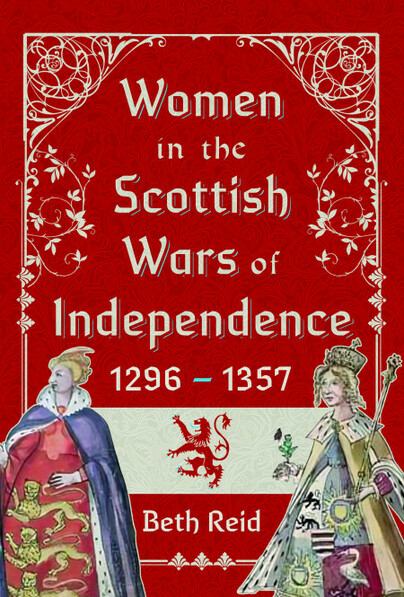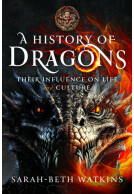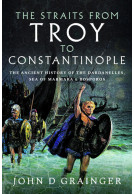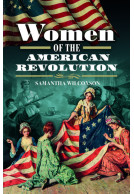Women in the Scottish Wars of Independence 1296–1357 (Hardback)
(click here for international delivery rates)
Need a currency converter? Check XE.com for live rates
The Scottish Wars of Independence are often celebrated for the heroic deeds of men, but behind the scenes, noblewomen played an equally pivotal role in shaping the nation’s fate. In Women in the Scottish Wars of Independence, Beth Reid brings to life the stories of these remarkable women, from royalty to influential landowners, whose contributions to Scotland’s turbulent history have long been overlooked.
From noblewomen like Isabella MacDuff, Agnes Randolph, and Agnes Comyn—who made kings, defended castles, and led conspiracies—to royal women who influenced key decisions and defined dynasties, this book paints a vivid picture of resilience, strategy, and courage. Through chronicles, royal charters, and material culture, Reid uncovers how these women navigated war and politics, revealing their critical yet underappreciated roles in shaping the outcomes of the Wars of Independence.
Focusing on noblewomen rather than ordinary lives, this book offers a fresh perspective on a male-dominated narrative, shedding light on the influential partnerships and actions of women who stood at the heart of Scotland's history. With meticulous research and compelling storytelling, Women in the Scottish Wars of Independence is essential reading for history enthusiasts eager to explore the often-untold contributions of Scotland’s noblewomen during one of its most formative periods.
Rating: 5 out of 5 stars
NetGalley, Lily Amidon
In this brilliant new book about medieval Scotland and women’s roles in the Scottish Wars of Independence, Beth Reid introduces readers to a wide variety of women whose contributions to Scotland’s history have been overlooked. Including the stories of noble and royal women like Isabella MacDuff, Agnes Randolph, Agnes Comyn, and the women of the Bruce family and stories of untitled landowners, this book covers a wide variety of lives, women, and experiences that contextualize women’s roles in the conflict. The book balances these many narratives and women perfectly and identifies their unique experiences and how they reflect larger ideas about medieval womanhood. Reid’s depth of historical research and detail is absolutely fantastic and brings these stories to life in incredible detail, and readers will be immersed in the Scottish Wars of Independence. Entertaining, brilliantly written, and detailed, this book is a fantastic addition to women’s history and Scottish history because it emphasizes women’s critical roles during conflict and how they coexist with these larger historical events and issues. The ways in which the historical figures are brought to life is absolutely fantastic, and readers will love the variety of stories and women that Beth Reid has brought to life in this brilliant new book.
Rating: 5 out of 5 stars
NetGalley, Heather Bennett
Interesting and informative, A good read for those interested in Scottish and or Women's History. Engaging and well written, easy to read to.
Rating: 5 out of 5 stars
NetGalley, Christy S
Beth Reid's Women in the Scottish Wars of Independence 1296–1357 successfully fills a significant gap in medieval Scottish history by spotlighting the noblewomen who shaped Scotland's fight for independence. Rather than focusing on the familiar male figures like Edward I, William Wallace, and Robert the Bruce, Reid brings forward the stories of remarkable women such as Isabella MacDuff (who crowned Robert the Bruce), Agnes Randolph (who defended Dunbar Castle), and Robert's own sisters and daughter Marjorie.
The book is well-researched yet refreshingly accessible—conversational rather than academic in tone—making it perfect for general readers interested in the period. Reid skillfully contextualizes the complex politics of the era while highlighting how these women's contributions were absolutely crucial to Scotland's survival as an independent state. From legitimizing kings to defending castles during sieges, these noblewomen demonstrated that their roles extended far beyond the household.
While the book is relatively short due to the scarcity of primary sources from this turbulent period (many documents were destroyed or removed from Scotland), Reid makes excellent use of available chronicles, royal charters, and material culture. The result is an entertaining and sympathetic account that's both horrific and inspiring in equal measure.
This is essential reading for anyone interested in medieval Scottish history or those wanting to challenge assumptions about women's roles in the Middle Ages. Reid has created an excellent launching pad for further research while restoring these heroic women to their rightful place at the center of Scottish history.
Recommended for readers of medieval history, women's history, and Scottish studies.
Beth Reid has brought the important roles of elite women in the Scottish Wars of Independence into the light in this intriguing book. She made me want to delve further into the lives of these medieval women, some of whom were incredibly brave. The stories she tells include those of Elisabeth de Burgh, Robert the Bruce’s Queen, Isabella McDuff, Katherine Beaumont and Agnes Randolph, but there are many more, such as Joan of the Tower.
NetGalley, Lisa Sanderson
Elusabeth de Burgh spent a long time in captivity in England, prized as the Scottish Queen, and only treated well because she was the daughter of an English ally. Although only glimpses of her influence on her husband’s reign are seen, her legacy survives seven centuries later because an annual endowment first ordered by her husband, is paid to the Auld Kirk at Cullen. Her funeral rites and the reaction to her death show that she was a respected and loved Queen.
Isabella McDuff defied her husband to support Robert, and was punished by imprisonment in a cage by the English. This is likely to have been a bedchamber in the castle, protected from the elements, but she was in isolation with little privacy from her captors. Mary, Robert’s sister, also received this harsh punishment.
Katherine and Agnes endured sieges of their castles, seeing to their servants and provisions. Independent aristocrats, they were both forced to be in charge of the defences. Agnes Randolph even exchanged jeering and witty banter with William Montague, the Earl of Salisbury, who was leading the attack on Dunbar Castle. When he began the siege by using large siege machines to throw missiles at the castle, she sent a young woman to the battlements dressed like a bride, to dust the walls where the missiles struck! This was deliberately in front of Montague!
This is perfect for history-lovers, especially readers interested in medieval Scottish history. It’s quite amazing just how courageous some of the women in this book were, but all of the elite women played an important role in these wars.
Rating: 5 out of 5 stars
NetGalley, Jude Campbell
I loved this book detailing the lives of royal Scottish woman during the period.
Focusing on these woman who suffered during the period adds a new dimension to a time period I am admittedly unfamiliar with.
The book is clearly very well researched and pulls from a range of sources as the women’s lives are detailed and where nothing can be found the author makes likely guesses.
Not all of the woman are royal but they are all of high status and prominent enough to be considered enemies by the English.
As the author states herself at the end this book only serves as a jumping off point for women’s lives as the time but it’s a brilliant starting point and I hope she continues to go on and expand the works.
Rating: 5 out of 5 stars
NetGalley, Etta Kavanagh
This book is a fascinating look at the role of women in the two Scottish Wars of Independence in the 13th and 14th centuries. Women may not have been in charge, but they had a significant role in the wars.
I’m familiar with the first Scottish War of Independence when King Robert the Bruce fought against King Edward I of England to keep Scotland independent. During the reign of Bruce’s son King David II, the English once again tried to take control of Scotland by installing a rival king.
During the first war, Bruce’s wife Elizabeth de Burgh, his daughter Marjory, his sisters Mary and Christina, and a noblewoman named Isabella MacDuff were captured and taken to England as hostages. The author spins the tale of their imprisonment and it’s really gripping. Mary and Isabella were kept in room-sized cages for much of their captivity. Marjory, who was just 10 at the time, was initially kept in a cage, but was later moved to a nunnery, as was her aunt Christina. Queen Elizabeth’s confinement was much less horrific than the others, not because she was a queen (Edward I didn’t regard her as queen) but because her father was a powerful ally to England and Edward didn’t want to antagonize him.
The author also delves into the stories of several noblewomen who defended their homes from sieges during the wars. The author notes that their role as the head of large households made them more than capable of keeping an estate safe and running during a siege.
The lack of primary sources for this time period (a lot of documents have been destroyed or taken from Scotland), so the book is relatively short. Despite that, it’s a really interesting look at the role women played in two devastating wars.
Rating: 5 out of 5 stars
NetGalley, Sarah Aspden
An absorbing read about some of the women who changed the course of Scottish and English history.
The struggle between the Edwards (I, II & III) of England and the Scottish after the death of Alexander III of Scotland has been told time and time again. From Edward I, the 'Hammer of the Scots' to William Wallace and Robert I (aka 'the Bruce'), these figures loom large in history. But what about the women who lived during those turbulent times? Often forgotten and overlooked, Beth Reid has tried to address that imbalance and bring to the forefront some of the characters who took part.
>From people such as Isabella MacDuff who crowned Robert the Bruce, to Robert's daughter Marjorie, from whom all the later Kings of Scotland - and after 1603 England - are descended, to Agnes Randolph, Countess of Dunbar and March who defended her home against a siege from the English, this book celebrates these heroic women and restores them to their rightful places, front and centre of Scottish history.
Lesser known figures however are also explored, looking at the fate and lives of Robert's sisters, and of other women who were forced into war, who had to endure sieges and protect their loved ones, sometimes at unimaginable costs.
Without the contributions of these women, it is hard to imagine Scotland surviving in the 1300's as an independent state - Isabella's actions for example were crucial to legitimize Robert. It is a great tragedy that so many historical records have been lost from this time, but this very readable account goes some way to showing their lives and fates. Entertaining, horrific and sympathetic in equal measures, this book is well worth a read if you have any interest in the period, or just want to challenge the tired assumption that women did nothing but bear children in those days.
About Beth Reid
Beth Reid is a dedicated historian with a passion for making Scottish history accessible to a broad audience. She holds a Master of Research (MRes) in Historical Research, graduating with Distinction, and specialises in the lives of women in medieval Scotland. As a social media writer and content creator, Beth works to introduce Scottish history and heritage to as wide and diverse an audience as possible. Through her Instagram and Substack platforms, both under the handle @HistoryWithBeth, she shares engaging content that brings Scotland’s rich past to life for her followers.














